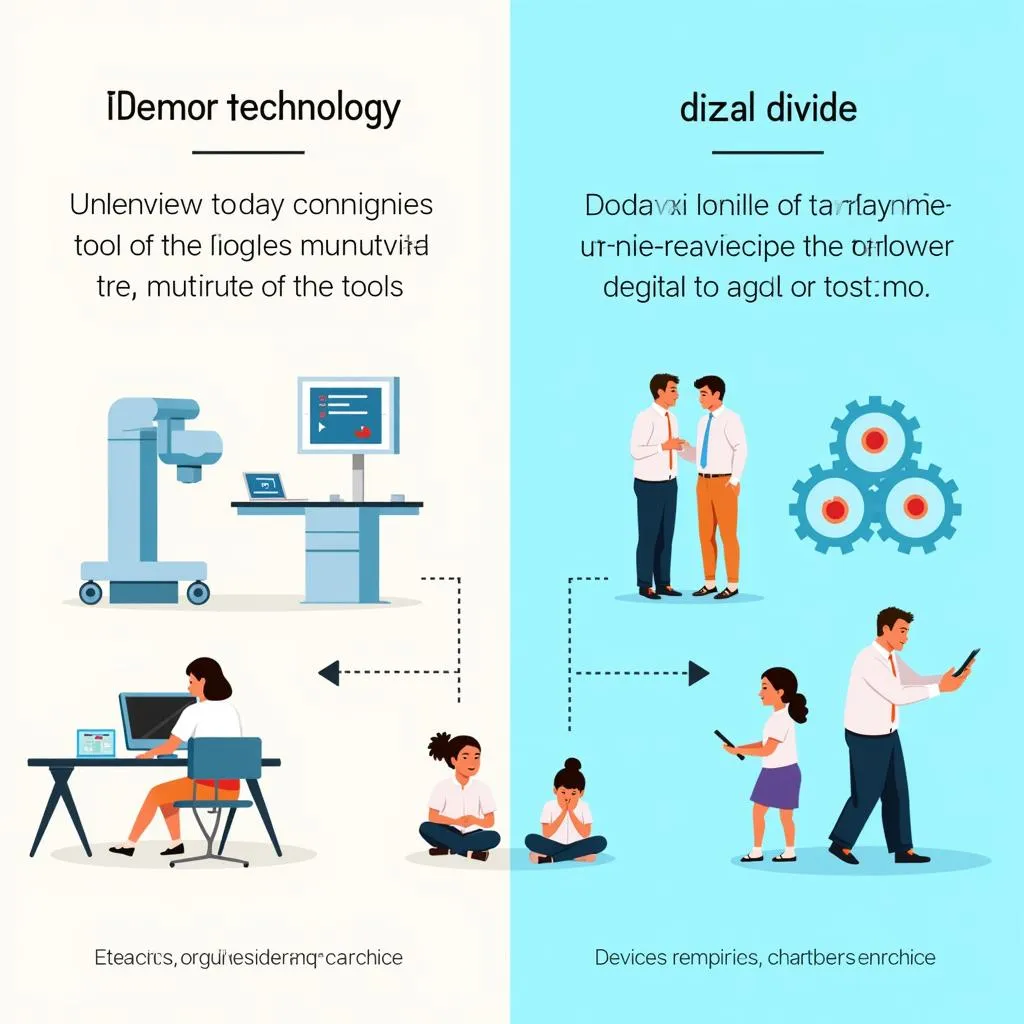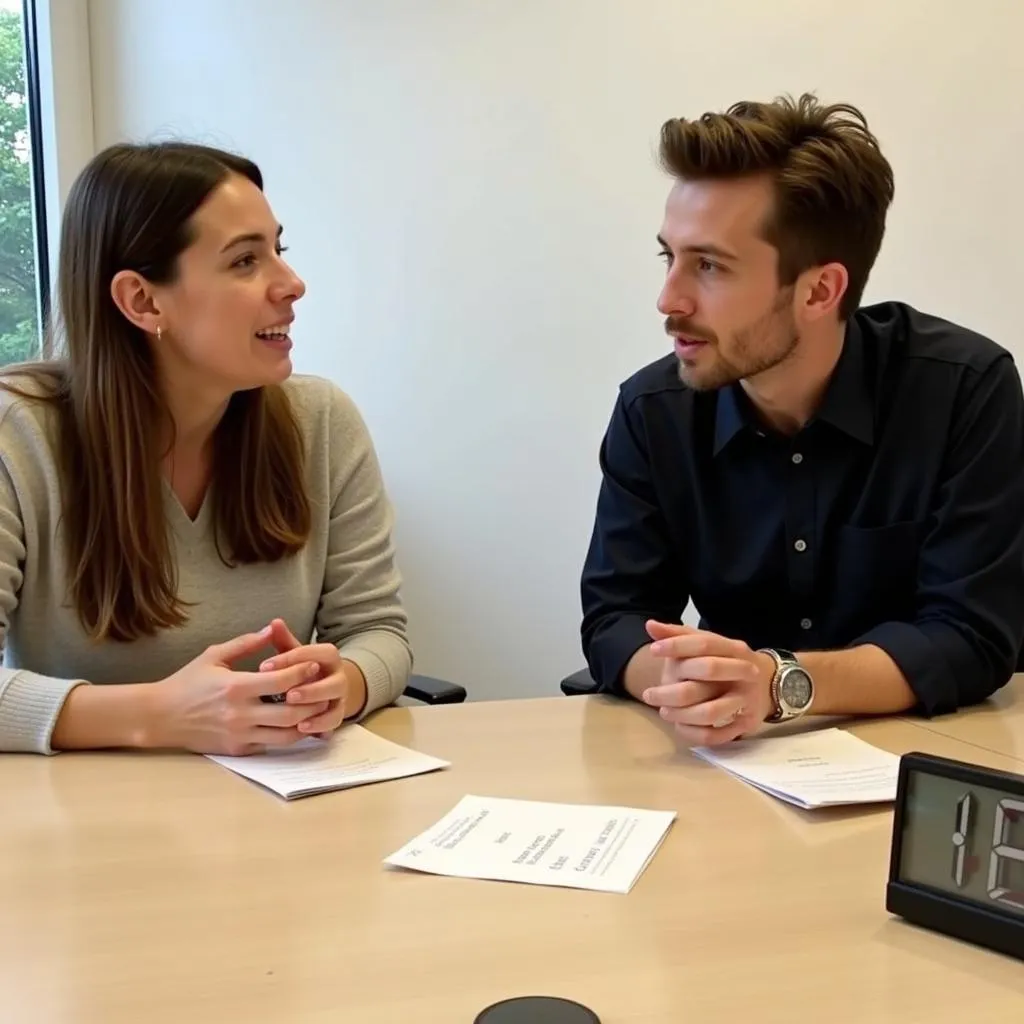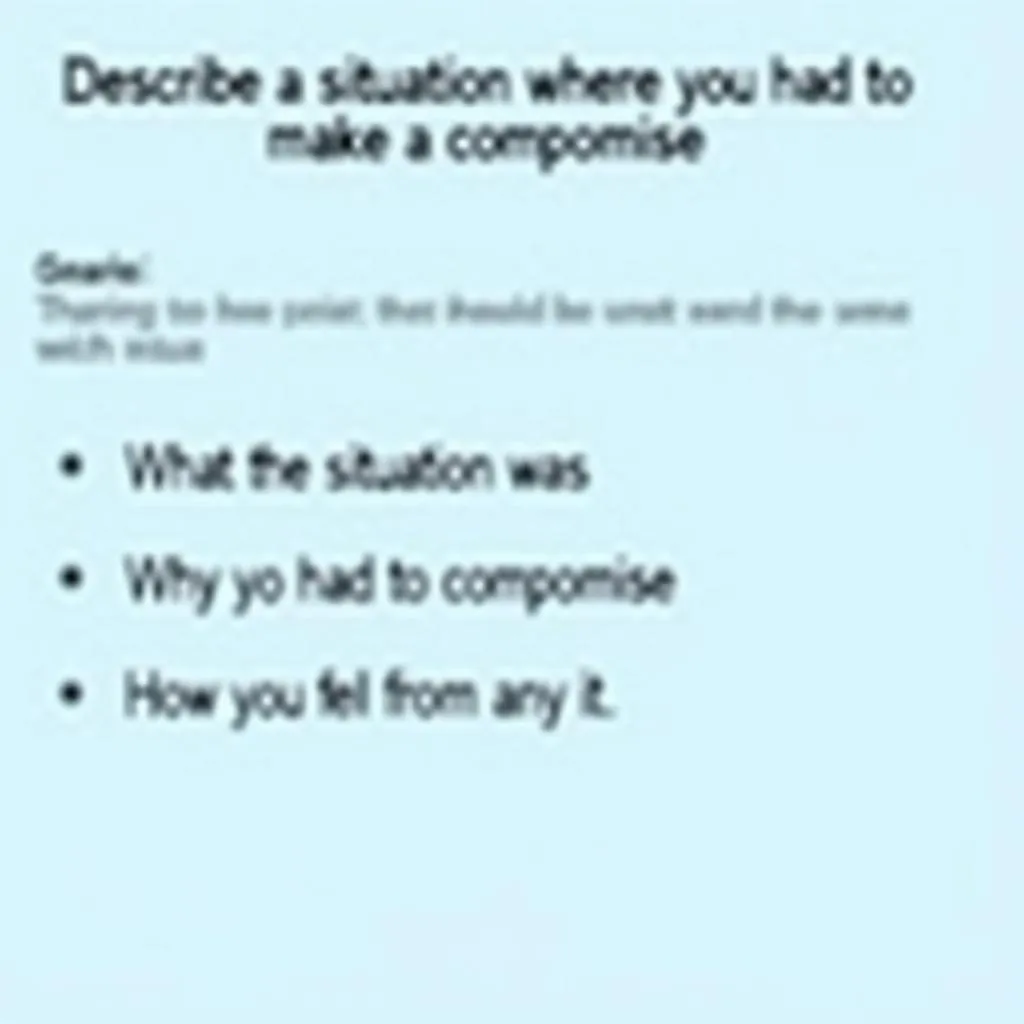The IELTS Speaking test often includes questions about everyday experiences, including discussing products or items we’ve purchased. A common topic that may arise is describing a product that was initially difficult to use. This theme allows examiners to assess your ability to articulate challenges, explain processes, and reflect on personal experiences. Let’s explore how to effectively tackle this topic and maximize your score.
Nội dung bài viết
Part 1: Introduction and Interview
In the first part of the Speaking test, you may encounter questions related to products and technology. Here are some potential questions and sample answers:
- Do you enjoy shopping for new products?
- How do you decide what products to buy?
- Have you ever returned a product you purchased? Why?
Let’s look at a sample answer for the third question:
Sample Answer (Band 7-8):
“Yes, I have returned products on occasion. The most memorable instance was when I bought a smartwatch that didn’t live up to my expectations. It was advertised as being waterproof, but after wearing it during a swim, it malfunctioned. I was quite disappointed with the false advertising, so I returned it to the store and explained the situation. Fortunately, they were understanding and offered a full refund.”
This answer demonstrates a good range of vocabulary, uses specific examples, and shows the ability to explain a situation clearly.
Part 2: Long Turn
Now, let’s focus on the main topic with a sample cue card:
Describe a product you bought that was difficult to use at first
You should say:
- What the product was
- When and where you bought it
- Why it was difficult to use
- How you learned to use it
And explain how you felt about the product after learning to use it.Sample Answer (Band 6-7):
“I’d like to talk about a coffee machine I purchased last year from an online retailer. It was a high-end model with various features, which initially made it quite challenging to operate.
When I first got the machine, I was overwhelmed by the number of buttons and settings. The instruction manual was thick and complicated, which didn’t help much. I struggled with even the basic functions like selecting the right grind size and adjusting the water temperature.
To learn how to use it properly, I had to watch several YouTube tutorials and join an online forum for coffee enthusiasts. It took me about two weeks of trial and error before I could consistently make a decent cup of coffee.
After mastering the machine, I felt a real sense of accomplishment. The coffee it produces is far superior to what I used to drink, and I’ve even started experimenting with latte art. Looking back, the learning process was frustrating but ultimately rewarding.”
Sample Answer (Band 8-9):
“I’d like to discuss a state-of-the-art drone I acquired about six months ago from a specialized electronics store. This particular model was touted for its advanced features, which, ironically, made it exceptionally challenging to operate initially.
Upon unboxing the drone, I was immediately struck by its sleek design and the myriad of controls on the remote. The instruction manual was voluminous and laden with technical jargon, which only served to exacerbate my confusion. The most daunting aspects were calibrating the gyroscope, setting up the GPS function, and mastering the various flight modes.
To overcome these hurdles, I embarked on a comprehensive learning journey. I enrolled in an online course specifically designed for my drone model, participated actively in drone enthusiast forums, and dedicated countless hours to practicing in open fields. It took nearly a month of persistent effort before I felt reasonably proficient in handling the drone.
After surmounting the initial learning curve, I was thoroughly impressed by the drone’s capabilities. The crystal-clear 4K footage and precise controls have allowed me to capture breathtaking aerial shots that I previously could only dream of. In retrospect, while the learning process was undeniably frustrating, it was ultimately immensely gratifying. This experience has not only enhanced my videography skills but also instilled in me a deeper appreciation for the intricacies of modern technology.”
 IELTS Speaking: Describing a challenging drone
IELTS Speaking: Describing a challenging drone
Follow-up Questions:
- Do you think companies should make their products easier to use?
- How has technology changed the way we use everyday products?
Sample Answer (Band 8-9) for Question 1:
“While I firmly believe that user-friendliness should be a top priority for product designers, I also recognize that there’s often a delicate balance to strike between simplicity and functionality. For cutting-edge products that offer advanced features, a certain level of complexity is sometimes unavoidable.
That being said, companies should invest heavily in intuitive user interfaces and comprehensive, yet accessible documentation. They could also leverage technology itself to aid users, such as through interactive tutorials or AI-powered assistants built into the products. This approach would cater to users of varying technical proficiencies without compromising on innovation.
Ultimately, the goal should be to minimize the learning curve while still delivering sophisticated functionality. This not only enhances customer satisfaction but also broadens the product’s appeal to a wider market segment.”
Part 3: Two-way Discussion
In this section, the examiner might ask more abstract questions related to product design and consumer behavior. Here are some potential questions:
- How do you think product design affects consumer behavior?
- What role should government play in regulating product safety and ease of use?
- Do you think the trend towards more complex technology is generally positive or negative for society?
Let’s look at a sample answer for the third question:
Sample Answer (Band 7-8):
“I believe the trend towards more complex technology has both positive and negative implications for society. On the positive side, advanced technology has led to significant improvements in various fields such as healthcare, education, and communication. For instance, sophisticated medical devices have revolutionized diagnostics and treatment, while complex algorithms have made personalized learning more accessible.
However, there are also drawbacks to consider. The increasing complexity of technology can lead to a digital divide, where those who can’t keep up with rapid advancements may be left behind. Additionally, our growing dependence on complex systems makes us more vulnerable to technical failures or cyber-attacks.
Ultimately, I think the key lies in striking a balance. We should continue to embrace technological advancements while also ensuring that these developments are accessible and beneficial to a wide range of people. This might involve improving digital literacy education and designing intuitive interfaces that make complex technology more user-friendly.”
Sample Answer (Band 8-9):
“The trajectory towards increasingly complex technology presents a multifaceted impact on society, encompassing both substantial benefits and noteworthy challenges.
On the positive side, the proliferation of sophisticated technology has catalyzed unprecedented advancements across numerous domains. In healthcare, for instance, cutting-edge diagnostic tools and AI-assisted surgical procedures have dramatically improved patient outcomes. The education sector has witnessed a paradigm shift with adaptive learning platforms tailoring content to individual student needs. Moreover, complex communication networks have facilitated global connectivity on an unparalleled scale.
Conversely, this trend is not without its drawbacks. The escalating intricacy of modern technology risks exacerbating socioeconomic disparities, potentially creating a technological elite and leaving others at a significant disadvantage. There’s also the concern of overreliance on complex systems, which could render society vulnerable to cascading failures or sophisticated cyber threats.
Furthermore, the rapid pace of technological evolution often outstrips our ability to fully grasp its ethical implications, raising profound questions about privacy, autonomy, and the very nature of human interaction.
In my view, the key to harnessing the potential of complex technology while mitigating its risks lies in adopting a holistic approach. This would entail prioritizing inclusive design principles to ensure technology remains accessible and intuitive, investing heavily in digital literacy programs across all demographics, and establishing robust regulatory frameworks to govern the development and deployment of advanced technologies.
Ultimately, while the trend towards complexity presents challenges, I believe that with thoughtful implementation and proactive measures, we can steer this technological revolution towards outcomes that are predominantly beneficial for society as a whole.”
 Impact of Complex Technology on Society
Impact of Complex Technology on Society
Key Vocabulary and Phrases
To achieve a high score in the IELTS Speaking test, it’s crucial to use a wide range of vocabulary and complex sentence structures. Here are some key terms and phrases that can help elevate your responses:
-
Intuitive interface (noun phrase) – /ɪnˈtjuːɪtɪv ˈɪntəfeɪs/ – A design that allows users to interact with a product easily and naturally.
Example: “The smartphone’s intuitive interface made it easy for even technophobes to use.” -
To grapple with (phrasal verb) – /ˈɡræpəl wɪð/ – To struggle or contend with a difficult problem or challenge.
Example: “I had to grapple with the complex settings before I could use the camera effectively.” -
User-friendly (adjective) – /ˈjuːzə ˈfrendli/ – Easy to use or understand, especially for someone without special training.
Example: “Despite its advanced features, the software remained surprisingly user-friendly.” -
Learning curve (noun phrase) – /ˈlɜːnɪŋ kɜːv/ – The rate at which someone learns a new skill, especially when graphed against time.
Example: “The steep learning curve of the new operating system frustrated many users initially.” -
To troubleshoot (verb) – /ˈtrʌbəlʃuːt/ – To find and solve problems in a machine or system.
Example: “I spent hours troubleshooting the printer before I realized it was simply unplugged.” -
Cutting-edge (adjective) – /ˈkʌtɪŋ edʒ/ – Very modern and advanced.
Example: “The company prides itself on producing cutting-edge technology.” -
To master (verb) – /ˈmɑːstə/ – To acquire complete knowledge or skill in.
Example: “It took me weeks to master all the features of the new smart home system.” -
Overwhelming (adjective) – /ˌəʊvəˈwelmɪŋ/ – Very great in amount, effect, or force.
Example: “The sheer number of options in the settings menu was overwhelming at first.”
Using these terms and phrases appropriately can demonstrate your language proficiency and help you achieve a higher band score in your IELTS Speaking test.
Tips from an IELTS Examiner
As an experienced IELTS examiner, I would offer the following advice to candidates preparing for the Speaking test:
-
Practice regularly: Consistent practice is key to improving your speaking skills. Try to speak English daily, even if it’s just talking to yourself.
-
Expand your vocabulary: Focus on learning idiomatic expressions and advanced vocabulary related to common IELTS topics.
-
Work on fluency: Aim to speak smoothly without long pauses. It’s okay to use fillers like “well,” “you know,” or “actually” occasionally to give yourself time to think.
-
Develop your ideas: Don’t just give short answers. Expand on your points and provide examples to support your opinions.
-
Listen carefully: Make sure you understand the question fully before answering. It’s okay to ask for clarification if needed.
-
Use a range of grammatical structures: Incorporate complex sentences and a variety of tenses to demonstrate your language skills.
-
Be aware of pronunciation: Work on your pronunciation, including individual sounds, word stress, and sentence intonation.
-
Stay calm: Remember that the examiner is there to assess your English, not to judge you personally. Try to relax and view the test as a conversation.
-
Be honest: If you don’t have personal experience with a topic, it’s okay to say so and then discuss it in general terms.
-
Reflect on your performance: After practice sessions, think about what you did well and what you could improve. This self-awareness will help you progress more quickly.
By following these tips and consistently working on your English skills, you’ll be well-prepared to tackle any topic that comes up in your IELTS Speaking test, including describing challenging products or experiences.
 IELTS Speaking Practice Session
IELTS Speaking Practice Session
Remember, the key to success in the IELTS Speaking test is not just about memorizing answers, but about developing the ability to communicate effectively and confidently on a wide range of topics. Good luck with your preparation!


